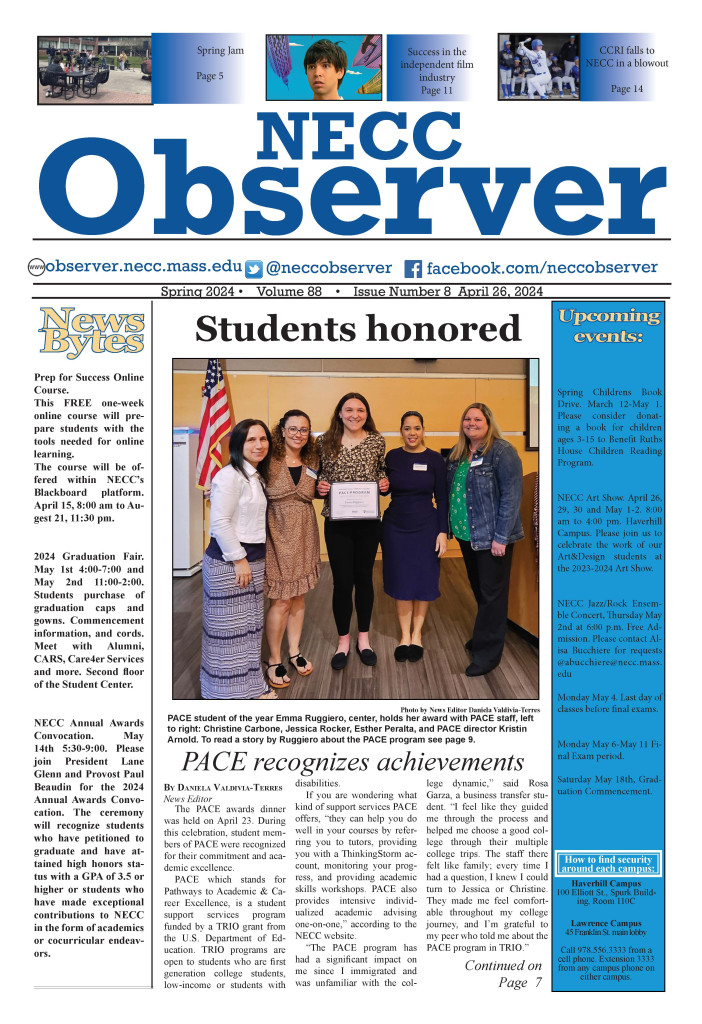About 50 students, faculty and staff attended the “Academy Meet and Greet” on Dec. 2 in the Hartleb Technology Center. The event was held in response to questions and concerns raised regarding the appropriateness of the training activities recently taking place on campus, especially since the addition of the Essex County Sheriff’s Department. A casual lunch of pizza and bottled water from 11:30 – noon gave attendees a chance to meet and interact with each other outside of the usual structured setting.
After a brief introduction by NECC President Lane Glenn, a speech was given by NECC Police Academy Director Tommy Fleming, followed by a speech from Mike McAuliffe, the director of the Essex County Sheriff’s Department Academy. A current student officer and a recent graduate of the Academy, Claudia Maldonado, also spoke about her experiences.
“I couldn’t be more blessed,” she said about her time in training.
At the conclusion of the speeches, the audience asked several questions that covered a range of topics from racial tolerance and affirmative action to the role that the academies would play in the event of a campus emergency to specific questions regarding the curriculum and exam process.
With regards to student and faculty concerns about the Academy causing possible disruptions on the campus, Glenn said that prior incidents, such as the “finger gun” drill on the C lobby stairwell, were a learning experience and part of the adjustment period.
“Those things won’t happen again,” he said.
The academy directors concluded by declaring their commitment to transparency. Interested students are invited to sit in on classes or discuss the curriculum with the directors and McAuliffe expressed his willingness to arrange a tour of the Middleton jail for anyone who would like to go and even offered to arrange transportation.
Glenn’s speech centered around the logic of using community college campuses for the training of police officers. He said that he was contacted by the Methuen chief of police regarding the lack of space available in which to train police officers in Massachusetts, and a plan was created to bring in the first class of student officers last year. This relationship opened the door for another agreement to be reached with the Essex County Sheriff’s Department this semester.
Post 9/11, said Glenn, the increase in desired security led to the addition of many more options in the field of criminal justice which Glenn would like to see offered at NECC. Currently, in Massachusetts, police officers are not required to have a college degree. The requirements include a high school diploma, academy training and sometimes a civil service exam.
But according to Glenn, student officers who have access to higher education are more likely to take advantage of it which would, by definition, lead to better trained officers in the field. Glenn discussed a proposal for a future plan that involves building a 100,000 square foot structure in Lawrence to house future classes of the NECC Training Academies and public safety training. The building would be shared with the Lawrence Police Department, but the project needs $70 million project in funding and is in the early stages of planning.
Students and faculty expressed varied reactions to the Meet and Greet. Some felt that the school had addressed most of their concerns, while others still felt that there were questions left unanswered.
“I think, in general, I feel a little better about it,” said student Katie Formosi. “From a club president point of view, I wish they’d given a heads up about taking over Lecture Hall A. On the other hand, they did say they were learning from complaints.”

